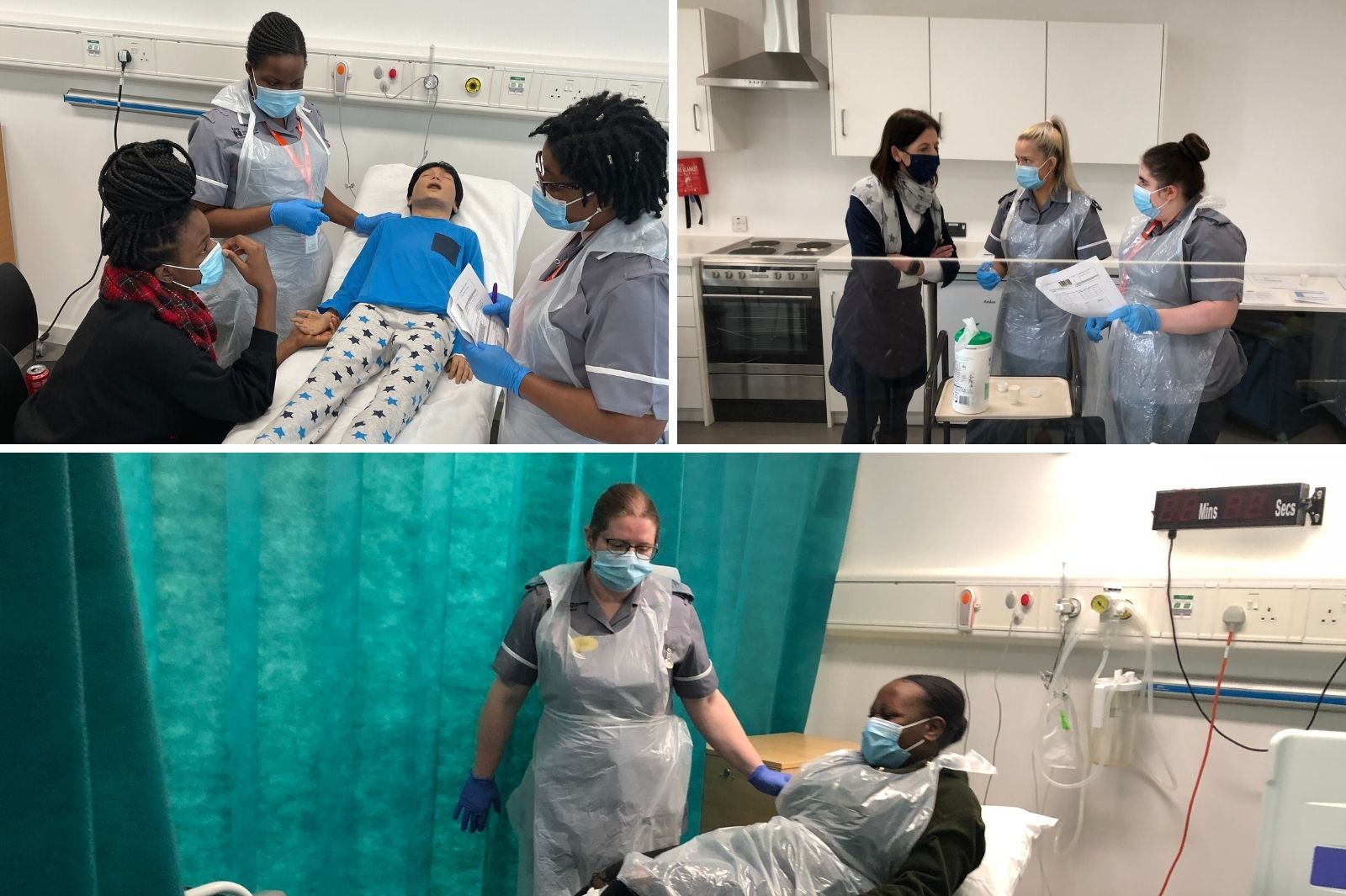‘Waterside General’ provides placements for Nursing students
Date 25.02.2021

The pandemic’s squeeze on one aspect of nursing students’ education has been resolved at the University of Northampton (UON) with a pop-up ‘hospital’ at Waterside campus.
As part of their degrees, nursing students must complete a set number of hours on clinical placement in settings such as hospitals, inpatient units and community settings, alongside registered nurses.
As with other universities across England at this point in time, most teaching and learning is being provided online. A small number of hours for face-to-face teaching are set for specific courses on a Government list.
Nursing is one of those courses, but with Covid restrictions in place across the health service, the number of hours available for clinical placements has been reduced across all fields of nursing.
This heralded a ‘lightbulb moment’ for UON’s Nursing lecturers about how to ensure students from their 2019 year get as much clinical experience as possible.
With Waterside teaching rooms for Nursing and Occupational Therapy mostly unoccupied, the team have created bespoke inpatient and community settings right in the centre of campus.
The students undertake an eight hour nursing shift each Saturday, starting at 9:15 in the morning. They work their way around a number of simulated scenarios that resemble – as close to real-life as possible – actual, nursing experiences.
The roles of each patient are played by other nursing students or life-cast models. They are supervised and assessed by qualified nurses from UON’s lecturing staff:
- In the acute hospital adult setting they meet Michael who has a fractured neck and femur and Emily who has diabetes and a lower leg wound.
- At the learning disability (LD) inpatient unit they meet Natalie who has an LD and is cared for alongside other patients.
- The mental health (MH) inpatient unit assesses students’ MH knowledge and skills with Sarah who has suicidal thoughts and is depressed.
- In the children’s and young people’s ward, students work with child life-cast models including Roscoe, who has abdominal pain and also meet his parents.
- In the community setting they meet Stan, Baby Zac and Peter, all with different medical problems that need assessing.
Adult Nursing student Gemma Farr commented: “The virtual ward day was great, so much more interactive and insightful than I thought it could be. The third year students were brilliant, their acting skills were fantastic and showed they had a great understanding of commonly encountered processes and problems in their field. They also knew their patient groups really well. I felt exhausted by the end of the day, but overall it was very enjoyable!”
Children’ and Young People’s Nursing student Phoebe Sawyer added: “I learned just how far I have come in my training. I have an inner confidence that the students brought out of me which I have been wary of displaying until now. I now feel much more confident within my opt-in management placement and more able to assist and support other students.”
Mental Health Nursing student Alexandra Ingram said: “I found the virtual wards brilliant and I had a fantastic time and learned a lot. The third-year students were so lovely and kind and gave such great advice. The virtual ward day really helped me practise some of my skills and learn lots of new ones. I feel a more confident going back into practice next week having attended the day.”
Learning Disability Nursing student Helen Morgan concludes: “The virtual ward shifts were amazing, very educational but enjoyable, too. All the lecturers were amazing and super supportive, helping me gain confidence in certain areas of care and know what I need to work on in the future. The diversity of experience that we were exposed to was amazing and realistic and overall really fun.”
Claire Clinker, Senior Lecturer in Adult Nursing, who created ‘Waterside General’. She said: “Firstly, a big thank you to our brilliant 2018 students for their support. We have been very lucky to have the support of our students who have been playing the parts of patients so that their peers can meet the EU directive when it comes to simulation on real people.
“The team and I also like to extend thanks to the qualified nurses who have given their time to help ‘staff’ our temporary ‘hospital’, whose expert assessments are invaluable.
“Our 2018 students excellent work does not stop here. When they are not being patients, they also provide a coaching role for their 2019 peers, equipping both groups for super-supportive futures.”